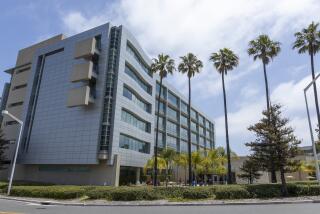Maritime Academy Racked by Bias Charges Gets 1st Woman Skipper
VALLEJO, Calif. — At the age of 42, Mary Lyons has studied to be a nun, has been an officer in the U.S. Navy, a professor of rhetoric, an academic administrator, a wife (now separated) and a mother.
Now she has been named president of the California Maritime Academy, the first woman selected to run one of the nation’s six major maritime schools.
Lyons takes over at a low point in the academy’s 60-year history.
For more than two years there have been continuing charges of sexual discrimination and harassment against female students and staff members. There also have been problems with students’ use of alcohol. Academy administrators have been unable to deal effectively with the troubles or with the public attention they have attracted. Members of the academy’s Board of Governors have fallen to quarreling among themselves.
Interviewed recently at her home in the East San Francisco Bay community of Fremont, Lyons said: “I’ve had experience with cases of this kind,” both in the Navy and in academic life. “I’m not a babe in the woods when it comes to these things.”
She has no grand design to solve the problems when she takes over in September but hopes to begin by making the academy’s 400 students and 145 faculty and staff members feel a bit better about themselves.
“A very short-term objective I would have is to try to inject some energy, a spark of confidence” into the school, she said. “The events of the last couple of years have been very demoralizing. It’s time to put that behind us and move on.”
Lyons may be helped by her varied academic and naval background. She is academic dean at the Franciscan School of Theology in Berkeley and still is in the Naval Reserve, commanding a unit that teaches shipboard firefighting and damage control.
“One of the reasons I applied for the (academy) job is that I thought it would give me a chance to bring those two parallel concerns (teaching and the Navy) together in a creative and constructive way,” she said.
Lyon spent five years in an Orange County convent but did not take final vows.
Unable to find a teaching job when she graduated from Sonoma State College in 1971, Lyons entered the Navy’s Officer Candidate School in Newport, R.I. Commissioned an ensign a year later, she spent three years on active duty, little of it at sea.
Then she returned to college, earning a master’s degree in English from San Jose State and, in 1983, a Ph.D. in rhetoric from UC Berkeley.
While Lyons was studying at Berkeley, she was hired by the Franciscan School of Theology, a tiny institution in the Berkeley hills, to teach seminarians and others how to preach effectively. After earning her Ph.D., Lyons joined the regular faculty and two years ago was named academic dean.
She is sad about leaving the Franciscans.
“They are wonderful people, almost like family,” she said. “There’s a twinge of pain about leaving. But they have been very supportive, everyone has wished me well.”
It was time to test her rhetorical skills, she said.
“I’ve been teaching oral argument and persuasion for a long time,” Lyons said. “Now I’ll see what I can do to argue on behalf of the academy. It will be a chance to find out if it’s true that if you can’t do a thing, you teach it.”
Lyons also hopes to continue her Naval Reserve career. With the rank of commander, she is in charge of a 35-member (mostly male) unit that teaches Navy personnel how to fight fires and control damage aboard ship--called by some the “learn or burn” school.
Lyons will have plenty of opportunity to exhibit her damage-control skills at the California Maritime Academy, which has been plagued by problems since the school’s training ship, the Golden Bear, went on its annual three-month Pacific Ocean cruise in early 1988.
On that cruise, and again in 1989, female students were subjected to flagrant sexual harassment, the National Maritime Administration said in a scathing report published last fall.
The report said a female student’s hat was thrown into the toilet, where it was covered with feces and urine. Later, the student was given demerits for appearing at formation without her hat.
The report said many of the episodes occurred during a ritual known as the “Equator crossing ceremony,” when “polliwogs”--those who had never crossed the Equator--were forced to engage in “acts of mock sodomy” with “shellbacks”--those who had crossed the Equator before. Other polliwogs had to slide down an inflated escape slide filled with rotten food.
One of the victims of this treatment complained to Rep. William Dannemeyer (R-Fullerton) and to state Sen. John Seymour (R-Anaheim), triggering a series of news stories and legislative inquiries.
Adm. John J. Ekelund, president of the Maritime Academy, at first characterized the training cruise events as “horseplay,” but soon took a more serious view. He abolished the Equator crossing ceremony, tightened discipline aboard the training ship and hired a psychologist to conduct sensitivity workshops about male-female relationships.
But the problems continued. There were allegations of sexual discrimination and harassment on the academy’s Vallejo campus, as well as aboard the training ship. In April, the school agreed to an $83,400 out-of-court settlement with a former female food service employee who said she had been subjected to continuous sexual abuse, both verbal and physical.
During the last academic year, two students were killed in drunk-driving accidents and a third committed suicide.
“We don’t think we’re any worse than any other college campus,” Dean of Students Tom Kilpatrick said, “but is there a problem with alcoholism? The answer is yes.”
As news reports about these events began to appear, state Sen. Milton Marks (D-San Francisco), chairman of the State Senate Select Committee on the Maritime Industry, sharply criticized lack of discipline and bad management at the academy.
Assemblywoman Jackie Speier (D-South San Francisco) said the maritime school was an elitist institution that was costing California taxpayers more than $7 million a year but enrolled few female or minority students.
This year’s enrollment is 85% male and 85% white. Of the 30 full-time faculty, only four are women and there are no blacks or Latinos.
The Legislative Analyst’s office suggested that the Maritime Academy could be abolished because the U.S. maritime industry is declining and there might not be jobs for the school’s graduates. But academy officials say they place 100% of their graduates and that many, especially marine engineers, start at annual salaries of $30,000 or more.
In the midst of all this, Adm. Ekelund resigned as president last January, saying, “It is apparent that the academy is seriously threatened unless management changes are made.”
The Board of Governors launched a search for a replacement, received 68 applications and narrowed the field to six finalists--four former Navy admirals and two captains.
At that point, the normally passive faculty rebelled.
“This was business as usual and, individually and separately, the faculty decided this wouldn’t do,” said George B. Parks, a veteran professor of mathematics and physics.
Twenty-nine faculty and staff members, including many of the most senior, wrote to the Board of Governors, asking that the search be expanded to include those whose qualifications were more academic than nautical.
Much to the surprise of many, the board agreed. Three candidates, including Lyons, were added to the list. The candidates were interviewed and Lyons, whose earlier application had been rejected, suddenly found herself the first woman in charge of a major maritime school.
Lyons said the academy will try to increase its percentage of female and minority students, as well as faculty and staff members, and has created a new “outreach” program toward that end.
But she warned that the pool of potential female faculty is small because women have not been encouraged to work in the maritime industry, where only about 3% are women.
“If you don’t see it out there as a career option, if you can’t image it, then you don’t think about doing it,” she said.
The new president said she was not surprised that sexism existed at the academy.
“Since sexism and racism exist throughout our society, I just assume it exists there,” she said. But that does not mean Lyons will tolerate sexual discrimination or harassment.
“You need to make sure everybody understands what sexual discrimination and harassment are,” she said. “You need to make sure policies are in place, that everybody understands them and that they are enforced.”
More to Read
Sign up for Essential California
The most important California stories and recommendations in your inbox every morning.
You may occasionally receive promotional content from the Los Angeles Times.










